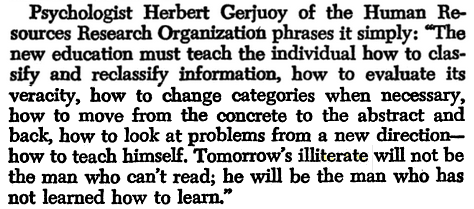Alvin Toffler perhaps put it best in his famous 1970 book Futureshock

Toffler said the following, just before he admitted the idea was from Psychologist Herbert Gerjuoy of the Human Resources Research Organization (Department of the U.S. Army).
Students must learn how to discard old ideas, how and when to replace them. They must, in short, learn how to learn. Early computers consisted of a “memory” or bank of data plus a “program” or set of instructions that told the machine how to manipulate the data. Large late-generation computer systems not only store greater masses of data, but multiple programs, so that the operator can apply a variety of programs to the same data base. Such systems also require a “master program” that, in effect, tells the machine which program to apply and when. The multiplication of programs and addition of a master program vastly increased the power of the computer. A similar strategy can be used to enhance human adaptability. By instructing students how to learn, unlearn and relearn, a powerful new dimension can be added to education.
Learn how to discard old ideas, how and when to replace them to be literate.
Learn, unlearn and relearn to be literate.
“Cornerstones of Attachment Research” is a new book that phrases it like this:
…early findings and ideas; these enter into circulation, ricochet and rebound among domains of practice, and get repeated and repeated. Later developments, even important ones, become difficult to access and incorporate…
John Maynard Keynes famously wrote something similar into the introduction to his 1936 “General Theory of Employment, Interest and Money” (paraphrased here):
The difficulty lies not so much in developing new ideas as in escaping from old ones.
And from a military perspective, I think Daniel Hulter’s USAF essay is my favorite take on the problem yet:
I’ve seen too many times when either those pilots mistook their role for simply keeper of the machine–they just let it do what it was gonna do, not seeing or caring where we fell outside the margins… or they saw that our situation wasn’t protected in policy and felt helpless themselves. They weren’t piloting the machine. They were just operators.
To be literate enough to become a pilot you have to extend beyond “keeper of the machine” and into adaptation, an example I often used to put in my big data security presentations in terms of flying versus fighting.
This was well known in WWII by American pilots over the Pacific Ocean who would come from below and behind to pick off Japanese pilots stuck in “keeper” mode formations.